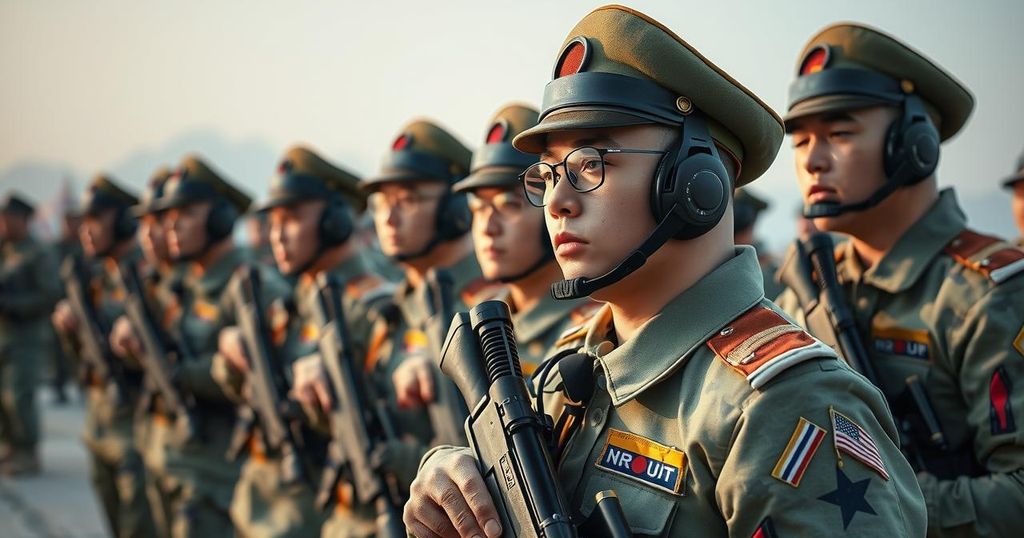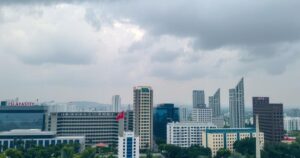Insights into the Deployment of North Korean Troops in Russia’s Ukraine Conflict

Former North Korean soldiers reveal that troops sent to aid Russia in Ukraine face severe malnutrition and lack training, despite being part of the elite Storm Corps. Recent intelligence reports suggest they possess high morale but may struggle with modern warfare tactics. Language barriers and a strong ideological commitment could complicate any potential defections, painting a complex picture of their motivations in this foreign deployment.
Haneul, a former North Korean soldier, vividly recalls the persistent hunger he endured during his military service, losing 10 kilograms in his first month due to an inadequate diet. After being assigned front-line duties, his battalion’s condition remained dire, as rations were often pilfered and diluted. Many defectors, including Haneul, have since provided insights into the situation of North Korean troops now deployed in Russia’s conflict with Ukraine. Reports indicate that North Korea has dispatched approximately 11,000 soldiers, primarily from the elite Storm Corps, to assist Russian forces. Though intelligence suggests they possess a measure of morale, concerns about their lack of contemporary warfare training remain prevalent. Defectors assert that the troops are still afflicted by malnutrition, which is apparent in online footage showing their frail stature. Despite being a specialized unit trained for infiltration tactics, they are ill-prepared for the conditions they may encounter in Ukraine.
Due to language barriers, miscommunication has already resulted in tragic incidents, including instances where North Korean troops accidentally fired upon their Russian allies, resulting in casualties. Some analysts warn it would be a mistake to dismiss these soldiers as mere cannon fodder, emphasizing their deep-rooted loyalty to the regime, and noting that morning indoctrination sessions further fortify their ideological commitment. Although some soldiers may view participation in foreign combat as an opportunity for social and professional advancement, they remain bound by a regime that would rather sacrifice less influential men than risk casualties among the politically connected. This aligns with Haneul’s recollections, wherein he observed the absence of generals’ offspring among ranks in frontline units.
Efforts to encourage defections among North Korean troops through psychological operations may face significant obstacles, as a heavy stigma surrounds the concept of surrendering. Additionally, being a prisoner of war is viewed as an intolerable disgrace within North Korean culture, prompting soldiers to be trained in self-termination tactics should capture seem imminent. Nevertheless, amidst these challenges, there are individuals like Lee, a former special forces trainer, who express a willingness to engage with these troops directly in hopes of influencing their outcomes.
In conclusion, the fate of North Korean soldiers deployed in Russia’s war remains uncertain. Experts suggest that while logistical and training deficiencies could hinder their effectiveness, their unwavering loyalty and ideological conditioning must not be underestimated. As the situation unfolds, the international community observes with concern and interest, understanding that the consequences may extend far beyond the immediate battlefield.
The deployment of North Korean troops to assist Russian forces in Ukraine amid ongoing conflict raises significant concerns regarding their conditions and capabilities. Historical accounts from defectors illustrate a grim reality within the North Korean military, characterized by malnutrition and inadequate training. Recent reports of their active engagement in combat suggest a clash of ideologies and the repercussions of a highly indoctrinated military culture. Understanding the background of these soldiers, including their motivations and the potential for their loyalty to the regime, is crucial in assessing their role in Russia’s military efforts.
In summary, the deployment of North Korean soldiers in Russia poses complex challenges informed by their military upbringing and the ideological loyalty instilled in them. Despite their dire condition and limited combat exposure, many are seemingly willing to engage in battle. The long-term implications of their involvement, particularly concerning their loyalty and the potential for defection, will continue to be a focal point in analyzing North Korea’s contribution to the conflict in Ukraine.
Original Source: www.bbc.com







